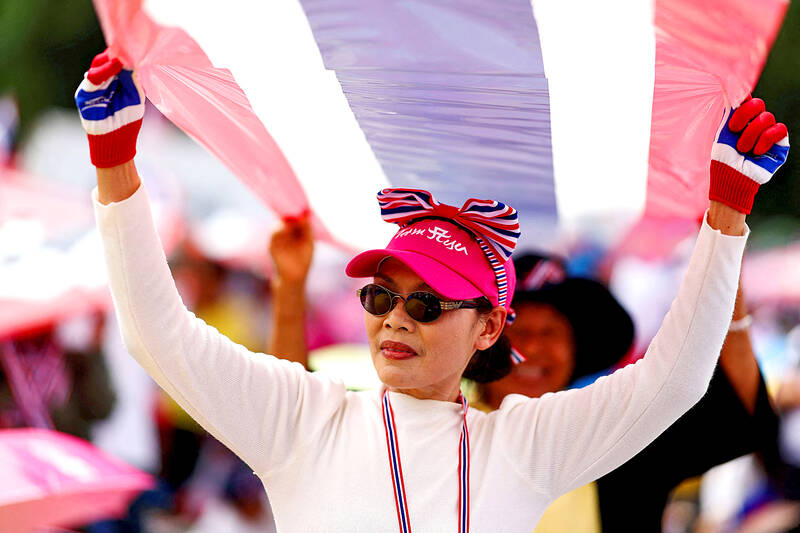Thousands rallied in Bangkok yesterday to demand the resignation of Thai Prime Minister Paetongtarn Shinawatra, part of the brewing political turmoil set off by a leaked phone call with former Cambodian prime minister Hun Sen.
Paetongtarn faces growing dissatisfaction over her handling of a recent border dispute with Cambodia involving an armed confrontation on May 28. One Cambodian soldier was killed in a relatively small, contested area.
The recorded phone call with Hun Sen was at the heart of the demonstration yesterday and has set off a string of investigations in Thailand that could lead to Paetongtarn’s removal.

Photo: Reuters
Outrage over the call mostly revolved around Paetongtarn’s comments toward an outspoken regional army commander and her perceived attempts to appease Hun Sen, the current Cambodian Senate president, to ease tensions at the border.
About 6,000 protesters joined the rally as of early afternoon yesterday, according to an estimate by the Bangkok police. Despite a downpour, they held national flags and placards around the Victory Monument in central Bangkok, as speakers took turns blasting the government. The participants chanted slogans, sang and danced to nationalist songs.
“From a heart of a Thai person, we have never had a prime minister who is so weak,” said Tatchakorn Srisuwan, 47, a guide from Surat Thani province. “We do not want to invade anyone, but we want to say that we are Thai and we want to protect Thailand’s sovereignty.”
There were many familiar faces from a conservative, pro-royalist group known as the Yellow Shirts. They are longtime foes of Paetongtarn’s father, former Thai prime minister Thaksin Shinawatra, who reportedly has a close relationship with Hun Sen and who was toppled in a military coup in 2006. Rallies organized by Yellow Shirts also helped oust the elected government of Thaksin’s sister, Yingluck Shinawatra, in a 2014 coup.
Hun Sen yesterday said the border action by the Thai army was a serious contravention of Cambodia’s sovereignty and territorial integrity, despite the country’s good will in attempting to resolve the border issue.
“This poor Cambodia has suffered from foreign invasion, war and genocide, been surrounded and isolated and insulted in the past, but now Cambodia has risen on an equal face with other countries,” Hun Sen told an audience of thousands at the 74th anniversary celebration of the founding of the Cambodian People’s Party in Phnom Penh.
The scandal has broken Paetongtarn’s fragile coalition government, costing her Pheu Thai Party the loss of its biggest partner, the Bhumjaithai Party. Its departure left the 10-party coalition with 255 seats, just above the majority of the 500-seat house.
Paetongtarn also faces other investigations that could lead to her removal from office.
Office of the National Anti-Corruption Commission secretary-general Sarote Phuengrampan on Wednesday said that his agency is investigating Paetongtarn for a serious breach of ethics over the Hun Sen phone call.
He did not give a possible timeline for a decision.
The prime minister on Tuesday said she was not worried and is ready to give evidence to support her case.
“It was clear from the phone call that I had nothing to gain from it, and I also did not cause any damage to the country,” she said.

CHAMPIONS: President Lai congratulated the players’ outstanding performance, cheering them for marking a new milestone in the nation’s baseball history Taiwan on Sunday won their first Little League Baseball World Series (LLBWS) title in 29 years, as Taipei’s Dong Yuan Elementary School defeated a team from Las Vegas 7-0 in the championship game in South Williamsport, Pennsylvania. It was Taiwan’s first championship in the annual tournament since 1996, ending a nearly three-decade drought. “It has been a very long time ... and we finally made it,” Taiwan manager Lai Min-nan (賴敏男) said after the game. Lai said he last managed a Dong Yuan team in at the South Williamsport in 2015, when they were eliminated after four games. “There is

Taiwan Semiconductor Manufacturing Co (TSMC, 台積電) is expected to start construction of its 1.4-nanometer chip manufacturing facilities at the Central Taiwan Science Park (CTSP, 中部科學園區) as early as October, the Chinese-language Liberty Times (the Taipei Times’ sister newspaper) reported yesterday, citing the park administration. TSMC acquired land for the second phase of the park’s expansion in Taichung in June. Large cement, construction and facility engineering companies in central Taiwan have reportedly been receiving bids for TSMC-related projects, the report said. Supply-chain firms estimated that the business opportunities for engineering, equipment and materials supply, and back-end packaging and testing could reach as high as

POWER PLANT POLL: The TPP said the number of ‘yes’ votes showed that the energy policy should be corrected, and the KMT said the result was a win for the people’s voice The government does not rule out advanced nuclear energy generation if it meets the government’s three prerequisites, President William Lai (賴清德) said last night after the number of votes in favor of restarting a nuclear power plant outnumbered the “no” votes in a referendum yesterday. The referendum failed to pass, despite getting more “yes” votes, as the Referendum Act (公民投票法) states that the vote would only pass if the votes in favor account for more than one-fourth of the total number of eligible voters and outnumber the opposing votes. Yesterday’s referendum question was: “Do you agree that the Ma-anshan Nuclear Power Plant

Democratic nations should refrain from attending China’s upcoming large-scale military parade, which Beijing could use to sow discord among democracies, Mainland Affairs Council Deputy Minister Shen You-chung (沈有忠) said. China is scheduled to stage the parade on Wednesday next week to mark the 80th anniversary of Japan’s surrender in World War II. The event is expected to mobilize tens of thousands of participants and prominently showcase China’s military hardware. Speaking at a symposium in Taichung on Thursday, Shen said that Chinese Minister of Foreign Affairs Wang Yi (王毅) recently met with Indian Prime Minister Narendra Modi during a visit to New Delhi.